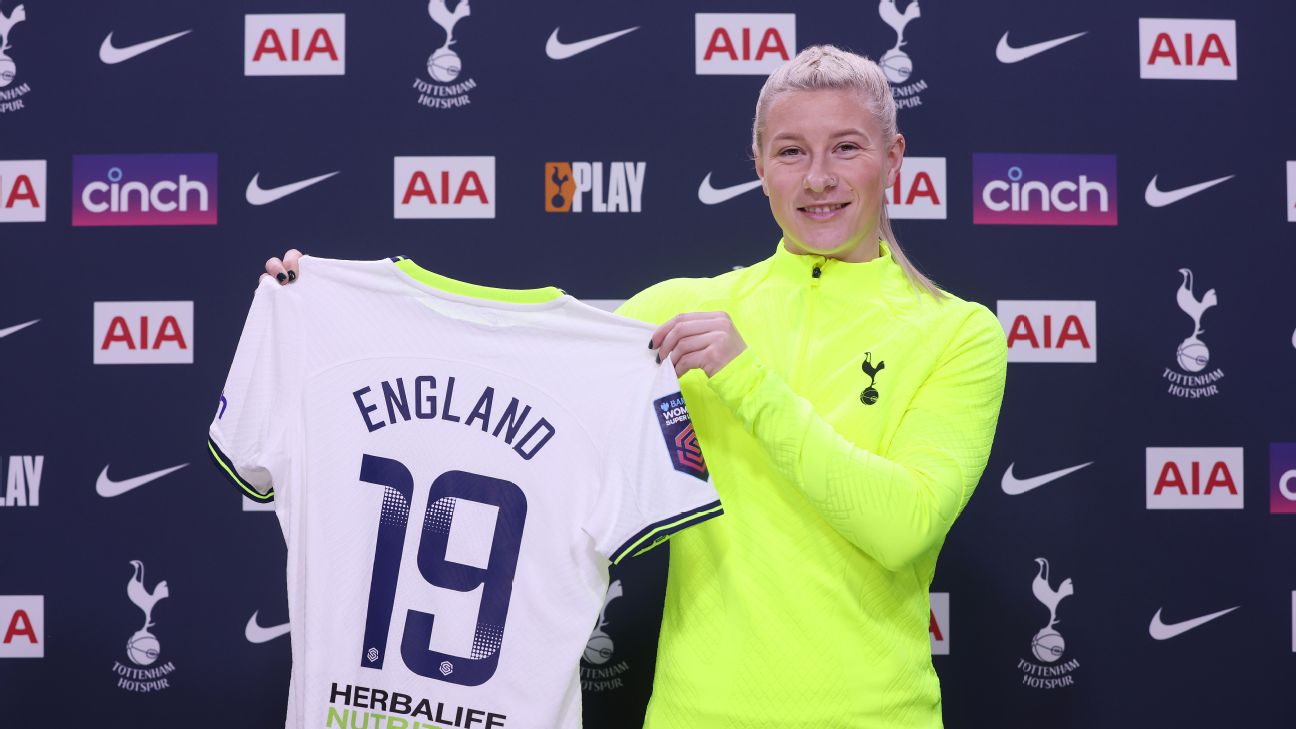What does Beth England’s record WSL deal mean for Tottenham, and for the women’s game as a whole?

Sophie Lawson explains that Spurs, Chelsea, England and the player all benefit from the WSL record transfer. (1:44)
Starved for playing time at Chelsea over the last couple of seasons, forward Bethany England has finally moved on to pastures greener — or at least, pastures that should feature more playing time, signing for Tottenham Hotspur in a blockbuster move on Wednesday.
A consistent goal-threat over her time in the Women’s Super League, England should help Spurs with their goal scoring draught, and Spurs are counting on that with the fee they are paying for her signature. Indeed, from the men’s game we know attackers tend to command bigger sums of money, but what is so notable about the winter move is the record transfer fee paid by Spurs for the 28-year-old.
Although there remains a general cloak of mystery about fees and wages in the women’s game, with a sizable margin for error when figures are reported, we do know that Chelsea received somewhere in the market of £250,000 for the sale, which makes it one of the priciest transfers in the women’s game and the biggest ever within the WSL.
– Stream on ESPN+: LaLiga, Bundesliga and more (U.S.)
For context, England midfielder, Keira Walsh is believed to be the most expensive signing in the women’s game, with her move to Barcelona last summer pocketing Manchester City around £400,000.
As the game grows, it should be no surprise to see larger and larger figures make headlines, but it was only seven and a half years ago that Chelsea were reported to have set a new British transfer record fee for Fran Kirby — at a cost of only one-fifth of England’s fee. Although the sums were disputed by the Blues, the reports suggested that the midfielder moved for between £40,000 and £60,000.
Though the game has come on leaps and bounds in that time with professionalism now the compulsory norm in the English WSL, it is jarring just how accelerated the figures have become — and for the teams at the top of the European game, it again raises the question of sustainability.
Whilst we may not be on the verge of any female player earning $75 million per annum, as Cristiano Ronaldo has been reported to be taking home from Al Nassr, there is the growing worry of how some longstanding clubs may be priced out of the evolving game. It further asserts the need for women’s teams to call upon the built-up wealth of their parent teams on the men’s side, with the sponsorship and revenue deals in women’s football growing but not yet allowing for most to splash out as teams like Chelsea and Barcelona have.
Whilst Spurs are not a traditional superpower in the women’s game — they only earned promotion to WSL ahead of the 2019-20 season, only two years after achieving promotion from the third tier — the club clearly has lofty ambitions, even if they’ve had a rocky run so far this season.
A season-long problem of scoring goals has plagued the Lilywhites but, far from simply not having a natural goal-scorer in their ranks, the team has at times failed to look like a creative entity. Spurs continue to labour in midfield with Kit Graham still on the way back from an ACL injury sustained in late 2021. Graham is not the only long-term absentee in the team but her absence is possibly the most palpable this season. For England to thrive at her new club, she will need service from her teammates, and this has been one of the larger failings of the Spurs team so far this campaign.
Yet, even if Spurs — currently eighth in the WSL with just three wins from nine so far this season — can find their mojo, it will be a gargantuan task to try to break the cemented top three persists in the WSL. The last time a team not called Arsenal, Chelsea or Manchester City finished in the top three was 2014 when Liverpool clinched the title in dramatic fashion on the last day of the season. Beyond that, no team outside of those three has won the FA Cup since 2011 when Birmingham City bested Chelsea on penalties. And, of course, no team away from the top three has ever won the league cup outside of Arsenal, Chelsea or City.
Still, there might yet be a new team representing the WSL in European football next season — Manchester United, for all their problems in the past, look most likely to disrupt the traditional WSL triumvirate, thanks in part to growing resources and support behind the scenes. But as the money spent continues to swell, the question of how long we have until the women’s game completely mirrors the men’s hangs heavy.
Indeed, England’s record transfer to Spurs shows the growth of the women’s game, but it also pushes us further into a world where the wealthiest clubs from the men’s game are the same ones we trot out when talking about prominence and European pedigree on the women’s side.